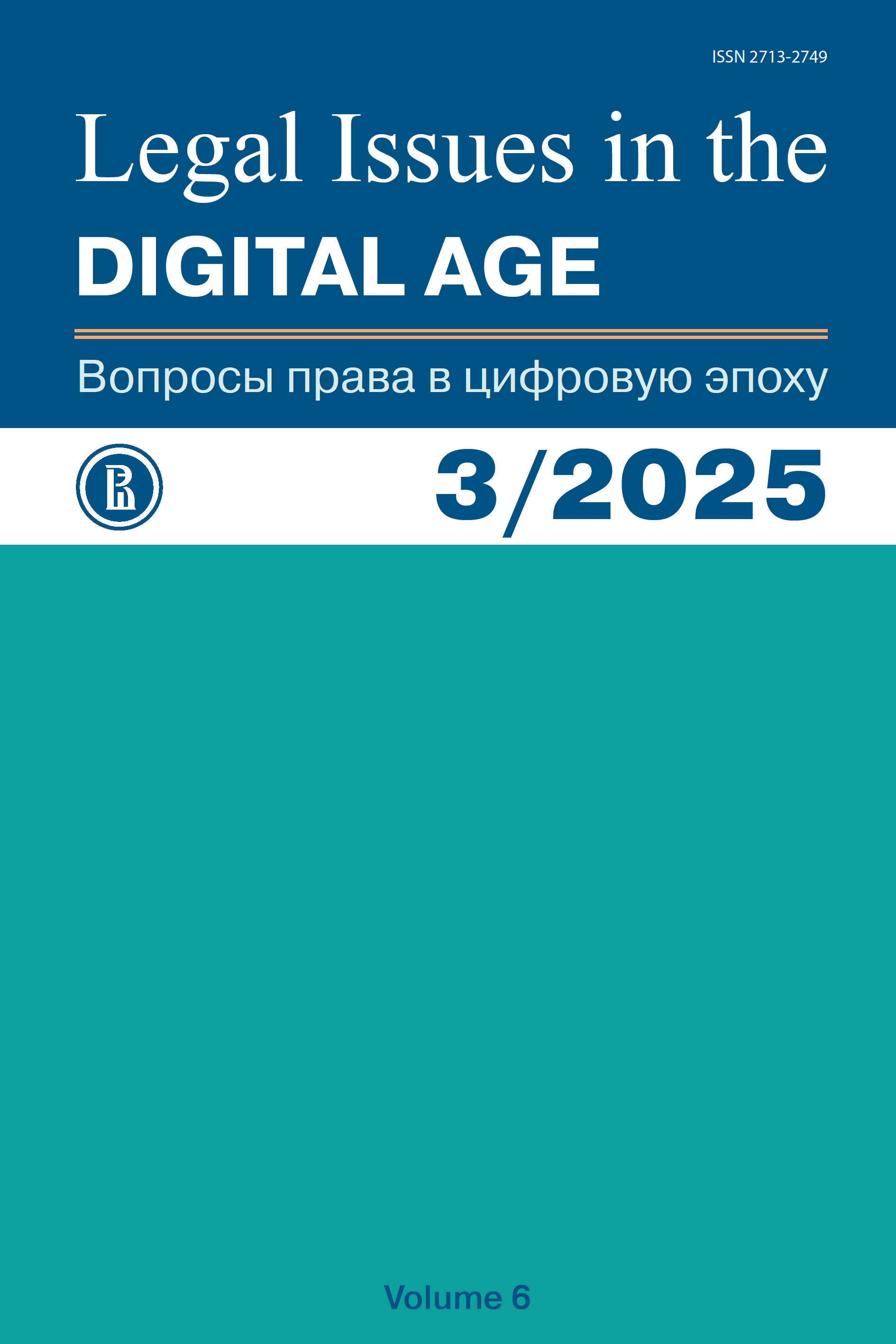Generative AI, Copyright and Personality Rights: A Comparative Legal Perspective
Аннотация
Generative artificial intelligence (AI) has unsettled traditional boundaries between human authorship, machine creativity, and personal identity. Systems such as large language models (LLMs), text-to-image generators, and voice-cloning technologies are trained on vast repositories of copyrighted material, extracting patterns to produce novel outputs. These outputs increasingly emulate the stylistic signatures of authors or replicate the likeness and voices of individuals without authorization. The processes of training and generation have therefore become focal points of contestation among artists, legal scholars, and policymakers, as they implicate both the integrity of copyright protection and the evolving contours of personality rights. The present paper examines the ways in which courts and policymakers are addressing the complex intersection of generative AI, copyright law, and personality rights, with particular emphasis on the protection of voice and likeness in India and in other jurisdictions. It situates recent legal and regulatory developments—such as Midler v. Ford Motor Co. in the United States, Tennessee’s ELVIS Act, and the Bombay High Court’s ruling in Arijit Singh v. Codible Ventures LLP—within broader scholarly debates concerning fair use, derivative works, originality, and the misappropriation of identity. Through a comparative lens, the analysis underscores divergent regulatory approaches: the United States’ reliance on litigation and common law doctrines; the European Union’s statutory framework prioritizing transparency, data protection, and opt-out mechanisms; and India’s evolving jurisprudence, characterized by judicial innovation through dynamic injunctions and the recognition of personality rights. The study advances a unified “Consent–Compensation–Control” (3C) framework that integrates copyright and personality rights as a coherent response to AI-driven infringements. This framework emphasizes the need for explicit consent in the use of creative works and personal attributes, equitable mechanisms of compensation for such uses, and practical legal and technological tools to maintain individual control over identity and expression. By bridging the longstanding doctrinal divide between intellectual property and personality rights, the framework aims to safeguard both creative labour and personal dignity, while simultaneously enabling innovation within responsible and clearly delineated boundaries.
Литература
Arps S., Meagher F. (2025) Fair Use and AI Training: Two Recent Decisions Highlight Complexity of This Issue. Available at: https://www.skadden.com/insights/publications/2025/07/fair-use-and-ai-training (accessed: 11.07.2025)
Baris A. (2024) Publicity Rights in the AI Era: Key Takeaways from Artist Arijit Singh’s Recent Legal Victory in India. The IPK at Blog. Available at: https://ipkitten.blogspot.com/2024/08/publicity-rights-in-ai-era-key.html (accessed: 20.05.2025)
Brooke R. (2024) Writing about Real People Update: Right of Publicity, Voice Protection, and Artificial Intelligence. Available at: https://www.authorsalliance.org/2024/03/07/writing-about-real-people-update-right-of-publicity-voice-protection-and-artificial-intelligence/ (accessed: 30.01.2025)
Bryant M. (2025) Denmark to Tackle Deepfakes by Giving People Copyright to their own Features. The Guardian. June 27. Available at: https://www.theguardian.com/technology/2025/jun/27/deepfakes-denmark-copyright-law-artificial-intelligence (accessed: 11.07.2025)
Fritz G., Ehlen T., Cuvan T. (2024) EU AI Act unpacked #8: New rules on deepfakes. Freshfields. 26 June. Available at: https://technologyquotient.freshfields.com/post/102jb19/eu-ai-act-unpacked-8-new-rules-on-deepfakes (accessed: 28.03.2025)
Kearns W., Rosenfeld J. (2023) D.C. Federal Court Holds Work Created Entirely by an AI System Cannot be Copyrighted. Available at: https://www.dwt.com/blogs/artificial-intelligence-law-advisor/2023/08/ai-artwork-copyright-district-court (accessed: 18.06.2025)
Kesseln M., Rippe G., Savare M., Sterba B. (2025) Federal Court Rules Against “Fair Use” Defense for AI Training. Available at: https://www.jdsupra.com/legalnews/federal-court-rules-against-fair-use-3740288/ (accessed: 14.05.2925)
Klosek K., Blumenthal M. (2024) Training Generative AI Models on Copyrighted Works is Fair Use. January 23. Available at: https://www.arl.org/blog/training-generative-ai-models-on-copyrighted-works-is-fair-use/ (accessed: 18.07.2025)
Maheshwari & Co. (2025) Generative AI & Copyright Law in India: Who Owns Machine-Made Works? July 16. Available at: https://www.lexology.com/library/detail.aspx?g=ec2ab57f-9934-45c6-9bce-fd7e6c04db71 (accessed: 04.08.2025)
Marcelin T., Cassetti F. (2025) AI and Copyright: The Training of General-Purpose AI. Available at: https://epthinktank.eu/2025/04/28/ai-and-copyright-the-training-of-general%E2%80%91purpose-ai/ (accessed: 02.07.2025)
Palmar D.G. (2025) AI Voice Cloning: how a Bollywood Veteran Set a Legal Precedent. WIPO Magazine. April 17. Available at: https://www.wipo.int/web/wipo-magazine/articles/ai-voice-cloning-how-a-bollywood-veteran-set-a-legal-precedent-73631 (accessed: 31.05.2025)
Patishman H. (2025) AI and Deepfake Laws of 2025. Aug. 12. Available at: https://regulaforensics.com/blog/deepfake-regulations/ (accessed: 18.07.2025)
Regan G. (2025) The State of Deepfake Regulations in 2025. Reality Defender. June 18. Available at: https://www.realitydefender.com/insights/the-state-of-deepfake-regulations-in-2025-what-businesses-need-to-know (accessed: 29.06.2025)
Sandler L. (2025) Federal Court Rules Against ‘Fair Use’ Defense for AI Training. February 14. Available at: https://www.jdsupra.com/legalnews/federal-court-rules-against-fair-use-3740288/ (accessed: 22.03.2025)
Saxena R., Narsipur S. (2024) AI Artistry: Who Holds Copyright? Copyright India. June 18. Available at: https://www.mondaq.com/india/copyright/1480076/ai-artistry-who-holds-the-copyright (accessed: 10.12.2024)
Suilmann P., Radeisen A. (2025) Landmark Court Decision in the EU: Copyright Permissibility of Text. January 5. Rails. Robotica and AI Law Society. Available at: https://blog.ai-laws.org/landmark-court-decision-in-the-eu-copyright-permissibility-of-text-and-data-mining-for-the-purpose-of-ai-training/ (accessed: 16.04.2025)
Trivedi S., Marks D.S. (2025) No ‘Fair Use’ Defense for Using Copyrighted Works for Training AI. February 18. Available at: https://www.beneschlaw.com/resources/no-fair-use-defense-for-using-copyrighted-works-for-training-ai-models.html (accessed: 19.05.2025)
Copyright (c) 2025 Chopra P., Sony R.A.L., Chopra S.

Это произведение доступно по лицензии Creative Commons «Attribution-ShareAlike» («Атрибуция — На тех же условиях») 4.0 Всемирная.
Авторы, присылающие рукописи для рассмотрения к публикации в Журнале, принимают Политику лицензирования, авторских прав, открытого доступа и использования репозиториев.









